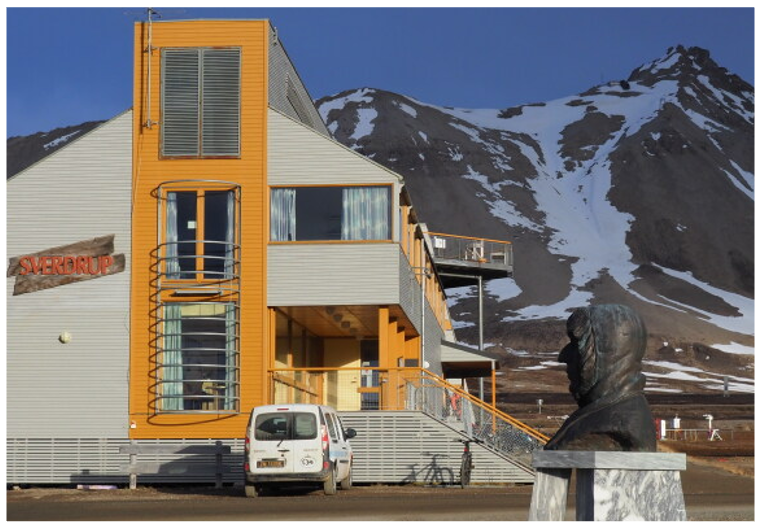Ny-Ålesund Research Station – Sverdrup, NO

Ny-Ålesund Research Station – Sverdrup, NO
Ny-Ålesund Research Station – Sverdrup is operated by the Norwegian Polar Institute.
Ny-Ålesund Research Station, which Sverdrup is a part of, is one of the world’s northernmost year-round research stations and provides unique access to a natural polar laboratory and extensive RIs. It is ideal for research and environmental monitoring related to the Arctic and climate change within the atmosphere, terrestrial and marine ecosystems , oceanography, glaciology, long range transported pollutants as well as other research disciplines.
Contribution to POLARIN key research challenges: 1, 2, 3, 4, 5, 6, 7
Information about Ny-Ålesund research station
Important information about the currently ongoing research activities, including the four Ny-Ålesund flagship programs, and the collaboration between the five partners offering access to Ny-Ålesund research station (AWI, IPEV, CNR, NERC and NPI is available here: https://eu-polarin.eu/ny-alesund/
Contact: Section leader Ny-Ålesund Arnt Rennan: HeadNPI.Nya[at]npolar.no ; research coordinator: Research.Nya[at]npolar.no
Website
https://www.npolar.no/en/sverdrup/
https://interact-gis.org/Home/Station/11
Location
The Ny-Ålesund Research Station – Sverdrup is part of the Ny-Ålesund Research Station on the northern side of Brøgger Peninsula at the southern shore of Kongsfjorden, Svalbard. Most of the infrastructure in Ny-Ålesund is owned and managed by the limited company Kings Bay. Institutions from many countries has long term research and monitoring programms running in Ny-Ålesund. The nearest civilian settlement is Longyearbyen, 100 km south of Ny-Ålesund.
Facilities
Ny-Ålesund was a mining town until the 1960s. After the mining was stopped, Ny-Ålesund started to develop into a research facility, beginning with the Norwegian Polar Institute establishment of a permanent research station in 1968. Today, institutions from 10 nations have long-term commitments in Ny-Ålesund, and scientists from many more nations visit Ny-Ålesund to conduct research. The Ny-Ålesund Research Station – Sverdrup hosts Norwegian projects and research groups from institutions without their long-term commitment in Ny-Ålesund. Sverdrup provides logistical support (boat-transport and equipement). Norwegian Polar Institute owns and manage the Zeppelin Observatory for long-term atmospheric monitoring. Up to 25 people can be accommodated at Sverdrup in the summer peak season.
Observatories linked to Sverdrup: The Zeppelin Observatory belongs to a group of important global observatories for atmospheric measurements. It is located at 472 m a.s.l. and away from global and local contamination sources.
Services offered
NPI offers various facilities, such as offices, workshops, instrument platform, logistical support (including boat transport), field equipment, polar clothing, and safety equipment. Snow mobiles can be rented through Kings Bay. Ny-Ålesund is run by Kings Bay, which provides flights, house and board, safety courses, weapons, and access to a range of shared laboratory facilities. Ny-Ålesund in total has about 13.000 research days annually, where around half of these are international.
What is included in the Access
Unit of access: User/day
Modalities of Access: in-person access
The access includes flights to Ny-Ålesund, lodging and board. Other services, as described above, are available but need to be included into the individual access application budgets. Applicants should consult the field equipment catalogue (NO/EN) for pricing. The typical duration of work is 1-2 weeks. Flights to/from Ny-Ålesund operate twice a week. Due to safety, field parties must be min. 2 persons. The researchers will be integrated into normal station operations along with other research and monitoring teams and will have to work within the operational framework of the station.
Kings Bay price list: https://nyalesundresearch.no/wp-content/uploads/2024/01/2024-nya-price-list-kb_v2_eng.pdf
Availability for access in the 2024 call
Sverdrup station is open year-around.
The availability for access in the 2024 call is 1st April 2025 – 30th April 2026.
While NPI can process requests for hosting a project with just a few weeks or months’ notice, access to Ny-Ålesund Research Station is also contingent on availability of flights and accommodation and might be limited in periods with high activity.
Time frame for access preparations
The booking to Ny-Ålesund is set up after a first come-first serve principle. Bookings should be, as a general rule, be submitted latest 1-2 months before the activity. The research group are asked to provide their booking in the RiS portal as soon as the access through POLARIN is confirmed.
Permits, licenses and training
Researchers and research institutions must familiarize themselves with applicable regulations and obtain all relevant permits from Norwegian authorities before initiating their research activities in Svalbard. Some research activities in Svalbard do not require prior consent from governmental agencies, others do. Most of Norway’s legislation applies also to Svalbard and regulates research-relevant activities in the archipelago. The Svalbard Environmental Protection Act and regulations derived from it in particular, is highly relevant to all field research in Svalbard. The Governor of Svalbard has introduced four fixed application deadlines per year for research activity on Svalbard. There are also other Ny-Ålesund specific local regulations, include permission from the land owner Kings Bay before installing instruments within the Kings Bay area plan, and guidelines and regulations regarding use of radio emitting equipment and use of the airspace in Ny-Ålesund. Read more here: https://www.sysselmesteren.no/en/researchers/ and https://nyalesundresearch.no/research-and-monitoring/researchers-guide/research-permissions/.
Polar bears are a threat anywhere on Svalbard, and anyone travelling outside the settlement of Ny-Ålesund must be equipped with appropriate means of protection (rifle and flare gun). Researchers will need a permit to hold and borrow a rifle on Svalbard. Read more about the permit needed here: https://www.sysselmesteren.no/en/weapon/.
In order to be able to rent rifles from Kings Bay, researchers need to attend the Kings Bay polar bear safety course (course on site the day of arrival/or following day) or another pre-agreed safety course by the University Centre on Svalbard (UNIS) or Norwegian Polar Institute. Booking of this must also be done through the RiS-portal.
Medical guidelines
No specific medical guidelines.

